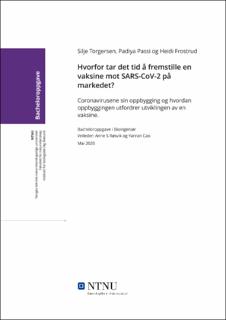| dc.contributor.advisor | Røsvik, Anne S | |
| dc.contributor.advisor | Cao, Yanran | |
| dc.contributor.author | Torgersen, Silje | |
| dc.contributor.author | Passi, Padiya | |
| dc.contributor.author | Frostrud, Heidi | |
| dc.date.accessioned | 2020-07-07T16:09:08Z | |
| dc.date.available | 2020-07-07T16:09:08Z | |
| dc.date.issued | 2020 | |
| dc.identifier.uri | https://hdl.handle.net/11250/2661276 | |
| dc.description.abstract | Den 11. mars 2020 ble utbruddet av Severe Acute Respiratory Syndrome Coronavirus 2 (SARS-CoV-2) erklært som en global pandemi. Viruset spredde seg raskt, og har rammet 213 land, områder og territorier. Det fører til luftveisinfeksjonen (covid-19), og for utsatte pasientgrupper kan dette være en livstruende tilstand. Helsepersonell er også i utsatte posisjoner med mye pasientkontakt og andre mulige smittebærere. Det beste forsvaret mot SARS-CoV-2 vil være en vaksine, som ikke vil være klar før om tidligst 12 måneder. Denne oppgaven bygger på et minimum av 10 forskningsartikler, og problemstillingen tar utgangspunkt i coronavirusene sin oppbygging og hvordan dette utfordrer utviklingen av en vaksine mot SARS-CoV-2. Søkemotorer som PubMed og MedLine har vært hovedkilden til informasjon. Det blir lagt vekt på ulike aspekter som kompliserer utviklingen av en velfungerende vaksine mot SARS-CoV-2. Deriblant virusets evne til mutasjon da det allerede er påvist tre mutasjonsvarianter av SARS-CoV-2. Det blir gjennomgått hva man frem til nå vet om det nyoppdagede SARS-CoV-2, blant annet dets oppbygning med en helikal symmetrisk nukleokapsid, som ikke er spesielt vanlig blant positiv-sense RNA virus. Videre presenteres smittemåter og inkubasjonstid. Det blir gjennomgått ulike typer vaksinemodeller, og en sammenligning av tidsbruken for ordinær og fremskyndet vaksineutvikling; hvordan en vaksine kan fremstilles på 12 måneder, fremfor de vanlige 10 årene. Innføring av vaksiner i Norge baseres på globale retningslinjer for et standardisert, transparent og kunnskapsbasert system. Til slutt belyses også etiske aspekter ved en for rask vaksineutvikling, og blir satt i sammenheng med tidligere erfaringer fra verdensomspennende epidemier og pandemier og økt vaksinemotstand. Forskning for å forstå det nye SARS-CoV-2 er tidkrevende, samtidig som prosessen med vaksineutviklingen vil kreve tid. Balansegangen mellom en rask nok og trygg nok vaksineutvikling er et dilemma. Samtidig skal samfunnet ha tillit til at den er trygg å ta. Alle disse faktorene er avgjørende for hvorfor en vaksine må ta tid. | |
| dc.description.abstract | On 11th of March 2020, the outbreak of the Severe Acute Respiratory Syndrome Coronavirus 2 (SARS-CoV-2) was declared a global pandemic. The virus has spread effectively, with confirmed cases of coronavirus disease of 2019 (COVID-19) in 213 different countries, areas and territories. SARS-CoV-2 causes the respiratory infection COVID-19, which can be life threatening to vulnerable patient groups. Health care workers are also at high risk due to close contact with patients and other potential carriers. A vaccine against SARS-CoV-2 will effectively stop the spread of the virus, but developing one will take at least 12 months. The object of this study is based upon the minimum of 10 other scientific papers, and gives an insight of the complex genomic structure of SARS-CoV-2 and why this causes challenges in vaccine development. Search engines like PubMed and MedLine have been the main sources of information. Other aspects which challenges the development of a new vaccine against SARS-CoV-2 have been mentioned. Including its abilities for mutation, three variants have been identified up to this point. There will be a presentation of what is known about the newly discovered SARS-CoV-2, including its structure of a helical symmetric nucleocapsid, which is uncommon for similar positive-sense RNA viruses. Furthermore, transmission pathways and incubation time of the virus will be mentioned. Different types of vaccine models will be presented, along with a comparison of the process traditionally and an expedited process; how a vaccine can be developed in 12 months and not 10 years. Implementation of vaccines in Norway is based upon global recommendations to achieve a standardized, transparent, and knowledge-based system. Furthermore, the ethics of an expedited vaccine development will be mentioned and is compared with earlier cases of global epidemics and pandemics along with increased vaccination resistance. The understanding of the new SARS-CoV-2 is time consuming, as well as the process of developing new vaccines. There is a fine line between quickly producing a new vaccine, while also maintaining the populations trust in the safety of the vaccine. All these factors are crucial to why a vaccine development cannot be rushed. | |
| dc.publisher | NTNU | |
| dc.title | Hvorfor tar det tid å fremstille en vaksine mot SARS-CoV-2 på markedet? | |
| dc.type | Bachelor thesis | |
